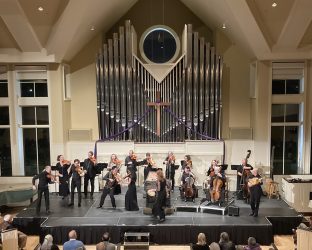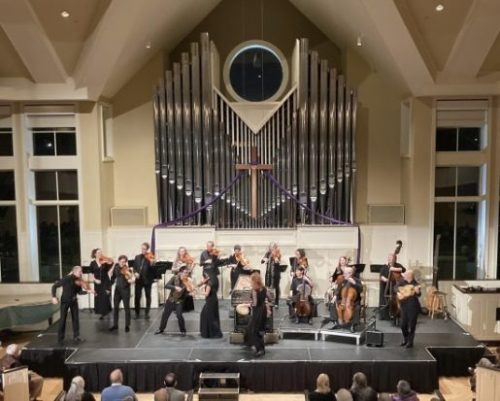 United States ‘Vivaldi’s Four Seasons Rediscovered’ – Various: Alan Choo (violin), Kathie Stewart (traverso), Ellen Saurer Tanyeri (traverso), Apollo’s Fire / Jeannette Sorrell (conductor). Bath Church, Akron, Ohio, 13.8.2024. (MSJ)
United States ‘Vivaldi’s Four Seasons Rediscovered’ – Various: Alan Choo (violin), Kathie Stewart (traverso), Ellen Saurer Tanyeri (traverso), Apollo’s Fire / Jeannette Sorrell (conductor). Bath Church, Akron, Ohio, 13.8.2024. (MSJ)

Uccellini – ‘La Bergamasca’
Marais – Suite from Alcione
Dall’Abaco – Concerto è più strumenti in E minor, Op.5, No.3
Vivaldi – The Four Seasons
Jaded critics love to pounce on hype. When a period-instrument ensemble that frequently plays a cornerstone of the Baroque repertory like Vivaldi’s The Four Seasons claims they are rediscovering it, that certainly smacks of marketing hype. But the thing is, Apollo’s Fire can give a concert that kind of conceptual title and then follow through on it.
In over a decade of covering classical concerts in Ohio, I have heard the ensemble in this piece a number of times, with soloists such as Olivier Brault, Francisco Fullana (with whom they recorded it) and Alan Choo. Throughout, the interpretation has been shaped by Jeannette Sorrell’s determination to reflect the work’s vivid program, while elements have been tweaked along the way, and each soloist has brought his or her own sense of discovery.
It has been fascinating to watch Alan Choo develop. His first foray into the work was in 2019, while he was serving an artistic fellowship with Apollo’s Fire, on his way to being named concertmaster and assistant director. He already had the technique, but he seemed unaccustomed to the level of freedom Sorrell was prepared to give him. Since then, Choo has grown in creative stature to the point where he tore into the part like a rock star, exploring the pictorial byways of the solo part but not losing track of the big picture. He ornamented the solo lines freely without ever overdoing it. Likewise, he had a way of losing himself in the most rhapsodic moments without snapping the narrative through line.
Sorrell’s shaping is seen at its best in moments where she leads from one movement to the next, making the narrative even more seamless. An example would be between the movements of the Summer concerto, where she hushed the end of the first movement to lead into the uneasy, thunder-threatened slow one, then started the finale quietly, building the thunder until its full eruption in the first solo. As ever, Sorrell insists on lavishing the slow movement of the Fall concerto with roulades and arpeggios in her harpsichord continuo, an error in artistic taste that breaks the spell. For years, she has presented it so and, for years, I have criticized it. No reason to expect either of us will ever yield. At least she gave this jaded critic something to happily gnaw at amid the plentiful beauty.
The entire ensemble has a well-established style of connecting among themselves as they play, so that different sections and individuals in the orchestra led, always within Sorrell’s established boundaries. This kept each of the musicians (fourteen in the Vivaldi) vitally engaged in what was going on, building the energy level, playing the piece as if they had never heard it before. The performance was electrifying and brought the crowd to their feet.
Hardly less vital were the Marais suite and the Dall’Abaco concerto. The Marais suite was from the opera Alcione, and it included the adorably pastel sounds of duetting traverso flutes (Kathie Stewart and Ellen Sauer Tanyeri) as well as stormy sound effects (!) – thunder sheet, wind machine and bass drum. The bridge between the elegant French style and the fiery Italian was a concerto by the little-known Evaristo Felice Dall’Abaco, whose work starts in the Italian concertante manner, but shifts toward a more galant style by the closing passepieds. Choo, Stewart and Tanyeri interplayed buoyantly.
The concert opened with the graceful ‘La Bergamasca’ dance by Marco Uccellini and closed with a boisterous encore performance of a traditional tarantella from Italy, replete with dancing in the orchestra. Apollo’s Fire rediscovers the joy of music every time. Better luck next time, jaded critic.
Mark Sebastian Jordan
